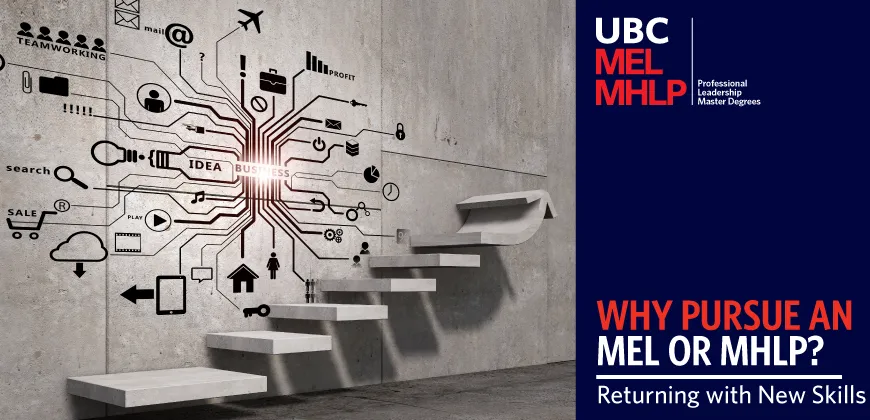Returning to work with new skills

For many professionals, there comes a time when they recognize that they need additional education or training to truly excel in their current position.
Perhaps they’ve been promoted into a leadership role only to find that their communication and project management skills aren’t at the same level as their technical abilities. Or they realize that a broader understanding of their sector would enhance their contributions to specific project and organizational goals. A postgraduate degree is a popular pathway for professionals wanting to expand their skills and accelerate their career.
UBC’s Master of Engineering Leadership (MEL) and Master of Health Leadership & Policy (MHLP) degrees offer sector-specific programs in 9 areas, providing a unique interdisciplinary education that balances graduate education in a technical specialty with education in business and leadership.
For those pursuing the MEL and MHLP to enhance their abilities in their current role, the programs are an excellent way to gain both a broader perspective on their sector and highly relevant business skills. Leandra Siems-Hoffman took a year’s leave from her position at Lurssen Yachts to complete the MEL in Naval Architecture and Marine Engineering in 2020 and is now back at work.
“The degree really encourages you to look at the bigger picture and to consider issues from multiple points of view,” she says. “So when I’m working, I do feel like I’m more open minded and actively considering more options.”
After graduating from the MEL in Dependable Software Systems in 2020, Anupam Yadav returned to Publicis Sapient, a digital consulting company where he has worked for almost eight years, now in the role of digital product manager for KPMG’s global digital marketing platform.
“I’m better able to pinpoint and articulate client concerns to my team, and to communicate any technical challenges we are facing to our clients,” he says. “I also feel more confident in my ability to manage teams and projects, with a course on organizational leadership giving me solid tools for being a better manager. I’m applying knowledge from my courses on a daily basis.”
All MEL and MHLP programs are offered as a one-year degree, with four programs (Integrated Water Management, Urban Systems, Clinical Education and Seniors Care) also offering a part-time option over 24 months for those who would like to continue working part-time while going to school. Students who take the part-time option say they’re able to apply their new skills to their organization as they learn. Now in the second year of her part-time degree in Integrated Water Management, Kate Yan says that her stronger business and communication skills have made her more effective in her current role as an assistant project manager for Stantec.
“I’m co-ordinating with experts from geotechnical, environmental, electrical, tunneling and hydraulic teams from offices across North America. Expanding my business and leadership skills has helped me do a better job in this role in terms of communication and project management. For example, the business courses required a lot of presentations and group work, and this has made me more confident bringing up issues in meetings and discussions.”
She also says that the program’s broad overview of water management issues will boost her ability to make contributions in technical areas beyond her current expertise.
“My work at Stantec has focused on stormwater management and linear infrastructure, and I’m now learning about areas – like water and wastewater treatment – that could definitely relate to future projects and opportunities.”
Sabrina Gill is in the first year of a part-time MHLP degree in Clinical Education and has completed several business and leadership classes.
“I am also sharing what I’m learning with my team at work, and they’ve commented on my increased energy levels,” she says. “I’m looking forward to applying my learnings from the project management class – such as the idea that 50 per cent of your time should be on planning and the rest on implementation.”
MEL and MHLP alumni who return to their organizations after graduating – and students who continue to work while studying part-time – are overwhelmingly positive about the leadership skills they developed during their program.
With their enhanced sector-specific knowledge, ability to work more effectively in collaborative teams, and new communication and leadership tools, they say they’re both more confident in their roles and better equipped to make meaningful contributions within their teams.





